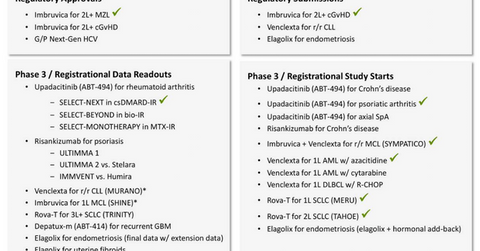An Update on AbbVie’s Clinical Pipeline in 2017
In December 2016, the European Commission granted Venclyxto conditional marketing approval for the treatment of CLL in the presence of 17p deletion or TP53 mutation.
Aug. 7 2017, Updated 10:37 a.m. ET

Venclyxto for chronic lymphocytic leukemia
In June 2017, AbbVie (ABBV) presented the results of its pivotal Phase 2 study with Venclyxto. The trial is to evaluate the safety and efficacy of the drug in the treatment of individuals with relapsed/refractory chronic lymphocytic leukemia (or CLL).
In the Phase 2 study, 77.0% of CLL patients treated with Venclyxto demonstrated an overall response rate (or ORR) that included complete remission, complete remission with incomplete marrow recovery, partial remission, and nodular partial remission. In the trial, 18.0% of patients could achieve complete remission, 53.0% achieved partial remission, 6.0% achieved a nodular partial response, and 27.0% achieved blood minimal residual disease (or MRD) negativity.
In December 2016, the European Commission granted Venclyxto conditional marketing approval for the treatment of CLL in the presence of 17p deletion or TP53 mutation in adult individuals who are not subjects for or have failed a B-cell receptor pathway inhibitor. Venclyxto was also given conditional marketing approval for the treatment of CLL in the absence of 17p deletion or TP53 mutation in adult individuals who did not respond to both chemoimmunotherapy and a B-cell receptor pathway inhibitor.
Venclyxto is jointly developed by AbbVie and Roche (RHHBY) through its subsidiary Genentech. AbbVie’s peers in the CLL drug market include Roche, Gilead Sciences (GILD), Johnson & Johnson, Novartis (NVS), and others.
Upadacitinib for Crohn’s disease
In May 2017, AbbVie presented the results of its Phase 2 CELEST trial, which was conducted to evaluate the safety and efficacy of multiple dosing regimens of upadacitinib for the treatment of individuals with moderately to severely active Crohn’s disease. The trial showed that 22.0% of the patients receiving upadacitinib 24 mg (milligrams) achieved endoscopic remission compared to 0.0% for patients under a placebo. Further, 27.0% of patients receiving upadacitinib 6 mg twice daily achieved clinical remission compared to 11.0% of patients who received a placebo. The determination of significant improvement in endoscopic remission and clinical remission was the primary endpoint of the Phase 2 CELEST study.
AbbVie has developed a robust clinical pipeline for a wide range of diseases. Promising results in clinical trials may help worldwide commercialization of the drugs in the trials. The SPDR S&P Dividend ETF (SDY) has ~1.7% of its total portfolio holdings in AbbVie.
